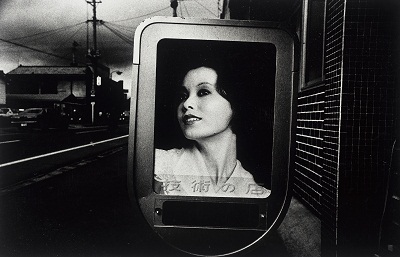LACMA rounds out its exhibition film series High and Low: Postwar Japan in Black and White tomorrow and Saturday evenings with four films inspired by the installation of seminal Japanese photographer Daido Moriyama's work that is on view now through July 31 in the Pavilion for Japanese Art. Moriyama first captured the art world's attention in the 1960s with his grainy, out-of-focus photos that portrayed the gritty underbelly of Tokyo in stark black and white.
 Daido Moriyama, Beauty Parlor, Tokyo, c. 1975, Ralph M. Parsons Fund, © 2012 Daido Moriyama
Daido Moriyama, Beauty Parlor, Tokyo, c. 1975, Ralph M. Parsons Fund, © 2012 Daido Moriyama
The films curated for this series were all made in the 1960s and could, hypothetically, be what Moriyama himself would have created had he a penchant for moving images instead. The films, like Moriyama's photos, offer a glimpse into a nation struggling to create a new world view, to regain some sense of identity, after a massive defeat in World War II.
Friday night's films feature a Shohei Imamura double bill: Pigs and Battleships, a raucous black comedy that satirizes Japan's postwar reality, and The Pornographers, maybe one of the greatest films about filmmaking ever made.
Saturday night closes out the series with Funeral Parade of Roses, Toshio Matsumoto’s taboo-breaking film that directly influenced Stanley Kubrick’s A Clockwork Orange, and legendary director Akira Kurosawa's gripping, race-against-time policier High and Low, starring Toshiro Mifune, arguably Japan's greatest movie star of all time (and frequent Kurosawa collaborator—the actor and director worked together on sixteen feature films).
You can purchase tickets online, at a LACMA Ticket Office, or by phone. LACMA Film Club members get half-price tickets (plus a bevy of other great benefits: exclusive screenings, priority ticketing for films and film-related events [read: Jason Reitman's popular Live Read series], and much more).
Jenny Miyasaki



